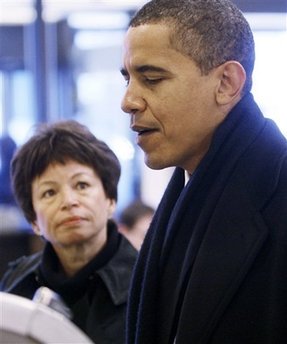By Rich Miller
Nov. 22 (Bloomberg) -- President-elect Barack Obama picked Timothy Geithner, head of the Federal Reserve Bank of New York, to be his Treasury secretary, with Lawrence Summers getting a senior White House role, a Democratic aide said.
Summers, former President Bill Clinton’s last Treasury chief, would be positioned to succeed Ben S. Bernanke as Fed chairman in 2010. Obama is likely to announce his economic team on Nov. 24, the aide said on condition of anonymity.
Geithner is a veteran who has helped lead the effort to end the deepest financial crisis in seven decades and at the same time has spent most of his career outside the public eye. The top task of the new team will be assembling Obama’s pledged stimulus package to buttress an economy that may be in its worst recession in a quarter century.
Obama is assembling “very strong people, very qualified people,” said Allen Sinai, chief economist at Decision Economics in New York. “But the reality of the problems of the economy, the financial markets, our banking system both domestically and globally, and the long list of problems we have to deal with as a society, that is very daunting.”
Geithner, 47, has helped oversee some of the biggest decisions so far in the crisis, as head of the U.S. central bank’s main liaison with Wall Street. Those include the government’s takeover of American International Group Inc., the Fed’s Bear Stearns Cos. rescue, and decision to let Lehman Brothers Holdings Inc. fail in September.
Top Spokesman
Both Geithner and Summers are veterans of managing financial turmoil, working together on the Asian financial crisis of 1997-98 and staving off a Mexican default earlier that decade. Even with that background, Geithner would be taking on an unfamiliar role: the government’s chief economic spokesman.
“He certainly has relevant experience,” said Alex Pollock, resident fellow at the American Enterprise Institute in Washington and former president of the Chicago Federal Home Loan Bank. “The whole public part of the job, the political part of Treasury secretary, will, I expect, be a challenge.”
Investors gave Obama’s pick a vote of confidence, sending the U.S. stock market’s benchmark index rallying from an 11-year low. The Standard & Poor’s 500 Index jumped 6.3 percent to 800.03 at the close in New York. The gauge is still heading for its biggest annual decline since 1931.
“Tim is held in high regard in financial circles and has been a thoughtful and effective leader throughout the recent financial turmoil,” said Robert Nichols, head of the Financial Services Forum in Washington and a former Treasury spokesman in the Bush administration.
Richardson for Commerce
Obama is also likely to nominate New Mexico Governor Bill Richardson as Commerce secretary, the Democratic aide said. Richardson was Clinton’s Energy secretary and former ambassador to the United Nations.
Geithner served as a Treasury undersecretary for international affairs under Summers, 53, and has been at the helm of the New York Fed since November 2003. Summers, who was Treasury chief from 1999 to 2001, and was once named top economist under 40, would be a contender to follow Bernanke, who was appointed by President George W. Bush and whose term ends in January 2010.
“He’s certainly on the short list, and perhaps on the top” for Fed chief, said Vincent Reinhart, former director of the Fed’s Division of Monetary Affairs who is now at the AEI in Washington.
Summers is now a professor at Harvard University, after previously serving as president of the Cambridge, Massachusetts institution. He spurred controversy while at Harvard over remarks about the number of women in scientific jobs.
Volcker Candidacy
Summers, along with former Fed Chairman Paul Volcker, were cited as candidates for the Treasury job by people close to the Obama camp earlier this month.
Kevin Warsh, a Fed Board governor, is a leading contender to succeed Geithner at the New York Fed, a U.S. official said on condition of anonymity.
Warsh, 38, previously worked at Morgan Stanley, later joining the Bush White House as an economic-policy adviser. He has been a link for the Fed board with securities firms during the crisis, drawing on his Wall Street contacts and experience.
Obama’s nominations would need to be confirmed by the Senate after he takes office on Jan. 20. Bush’s Treasury secretary, Henry Paulson, has pledged to work with his successor during the transition.
Auto Industry
Among the new team’s other top tasks may be devising a response to calls from General Motors Corp., Ford Motor Co. and Chrysler LLC for government aid to prevent their collapse, and overseeing an overhaul of U.S. financial regulations.
Jacob Lew, the White House budget director under Clinton from 1998 to 2001, will be named to the position of National Economic Council director, a person familiar with the transition team said. Lew, 53, served under Clinton from 1998 to 2001 and is currently chief operating officer at Citigroup Inc.’s alternative investments unit. The NEC, which was created by Clinton, is designed to coordinate economic policymaking.
Peter Orszag, the head of the Congressional Budget Office, has been offered Lew’s old job as head of the White House Office of Management and Budget, a congressional aide and a party official said earlier this week.
The decision to let Lehman fail in September has been faulted by observers including University of California at Berkeley professor Barry Eichengreen for triggering a renewed bout of turmoil that hammered credit markets.
Lehman Decision
Paulson, who led the decision to let Lehman go, and Bernanke have defended the move, saying the investment bank lacked sufficiently solid collateral to qualify for government aid, at a time when the $700 billion financial rescue plan had yet to be enacted.
Geithner is no stranger to Washington or the Treasury. Before taking over the New York Fed in 2003, he spent most of the previous 18 years working in the nation’s capital, first at Kissinger Associates, then at the Treasury and finally at the International Monetary Fund.
Over that time, Geithner earned what his one-time mentor Summers called a “doctorate in financial policy.” He also developed a skill-set his supporters say makes him well suited for his new job: calmness under pressure, an ability to see many sides of a problem and a sense of the politically possible.
“During the Mexico crisis, some of us would occasionally be emotional about something,” said Jeffrey Shafer, who served with Geithner at the Treasury from 1993 to 1997 and who is now Vice Chairman of Global Banking for Citigroup in New York. “Tim was the calm guy in the room who made sure we looked at all sides of the issue.”
Asian Experience
Geithner, who has studied Japanese and Chinese and has a Master of Arts in international economics from Johns Hopkins University, also played a key role in the Treasury’s dealings with the Finance Ministry in Tokyo. He was less inclined to intervene in currency markets than some other officials at the time, according to Shafer.
Born in New York, Geithner has lived in Africa, India, Thailand, China and Japan. He graduated from Dartmouth College in 1983 with a bachelor’s degree in government and Asian studies. He and his wife, Carole Sonnenfeld Geithner, have two children.
Dino Kos, a former New York Fed official, described Geithner as a “pragmatist, not an ideologue” who has a good sense of the political dynamics in Washington and the need to keep lawmakers in the loop about what’s going on. That’s been especially important in the current crisis as the Fed has taken extraordinary actions to limit the financial fallout, including its rescue of AIG in September.
Briefing Lawmakers
“If you’re going to push the envelope -- as the Fed has been doing -- you need to keep legislators informed about what you’re doing and why you’re doing it,” said Kos, who’s now a managing director at Portales Partners in New York.
Summers, an adviser to Obama during the campaign, earlier this week urged a fiscal stimulus package big enough to spur the economy for the next two to three years.
The U.S. economy shrank at an annual rate of 0.3 percent in the third quarter, and economists surveyed by Bloomberg News anticipate the longest contraction since 1974-75.
The next Treasury secretary will have unprecedented powers, in charge of overseeing a $700 billion rescue program that was enacted last month and designed to prevent a financial collapse. Paulson has allocated $250 billion to buying stakes in banks, and used another $40 billion for AIG.
Budget Deficit
Geithner would also inherit a record budget deficit. The bond dealers that advise the Treasury this month forecast a $988 billion shortfall for the financial year ending in September 2009. Paulson this week said the government will issue $1.5 trillion of debt.
Summers said Nov. 17 at a forum in Washington with Paulson and former Treasury Secretary Robert Rubin that ballooning debt isn’t a major issue for now because there’s “excess demand” for Treasuries rather than excess supply, as investors flock to government debt as a haven.
“The next secretary is going to have to be a crisis manager and plan for the future,” Rubin, who preceded Summers at the Treasury, said in an interview before yesterday’s news. “He’ll have to operate on two fronts at the same time.”
As president of the New York Fed, Geithner has enjoyed a special status at the central bank. He is vice chairman of the Federal Open Market Committee that convenes regularly to decide on interest rates. He votes at every FOMC meeting, unlike the presidents of the Fed’s other 11 member banks.
Gravitas Question
When Geithner was first tapped to take over the New York Fed five years ago, it was bit of a surprise. The boyish-looking technocrat lacked the stature of some of his predecessors -- including E. Gerald Corrigan, now with Goldman Sachs, and Volcker, who ran the New York Fed before becoming chairman of the Federal Reserve Board in 1979.
“He was very young and he speaks very softly,” said Blackstone Group LP co-founder Peter G. Peterson, who headed the search team that chose Geithner. “The question was, ‘Does he have the gravitas, the strength and the personality to make the tough decisions?’” The answer, he added, turned out to be yes.
Derivatives Market
Geithner spotted potential problems in the more than $47 trillion credit-derivatives market early on in his tenure at the New York Fed and began pressing banks in 2005 to reduce trading backlogs that could prove dangerous should a crisis hit.
He also warned that year that Fannie Mae and Freddie Mac needed more capital to offset the risks that they were taking in the mortgage market. They’ve since been taken over by the government after being ruled insolvent by their regulator. Paulson said yesterday it will be up to the Obama administration to decide the future of the two companies, which account for more than half of U.S. home-loan financing.
Some experts, including monetary economist Anna Schwartz, have condemned the Fed for putting $29 billion of its balance sheet on the line to back the takeover of Bear Stearns by JPMorgan Chase & Co. in March. Geithner in particular has been singled out, amid accusations that his time at the Treasury made him more prone to government interference in the economy.
In his new position as Obama’s Treasury secretary, it will be up to Geithner to spell out the administration’s financial and economic policies to the public. It’s not a role he is used to playing.
“Moving into that office would involve an adjustment to being more in the public eye, to being the guy on the firing line,” Kos said.
To contact the reporter on this story: Rich Miller in Washington at rmiller28@bloomberg.net
Read more...









